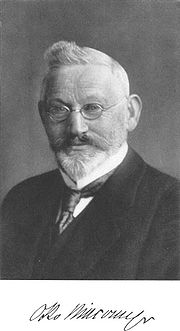
Otto Binswanger
Encyclopedia

Psychiatrist
A psychiatrist is a physician who specializes in the diagnosis and treatment of mental disorders. All psychiatrists are trained in diagnostic evaluation and in psychotherapy...
and neurologist
Neurologist
A neurologist is a physician who specializes in neurology, and is trained to investigate, or diagnose and treat neurological disorders.Neurology is the medical specialty related to the human nervous system. The nervous system encompasses the brain, spinal cord, and peripheral nerves. A specialist...
who came from a famous family of physicians; his father was founder of the Kreuzlingen
Kreuzlingen
Kreuzlingen is a municipality in the district of Kreuzlingen in the canton of Thurgau in north-eastern Switzerland. It is the seat of the district and is the second largest city of the canton, after Frauenfeld, with a population of over 18,000...
Sanatorium, and he was uncle to Ludwig Binswanger
Ludwig Binswanger
Ludwig Binswanger was a Swiss psychiatrist and pioneer in the field of existential psychology...
(1881-1966) who was a major figure in the existential psychology movement. He was brother-in-law to physiotherapist Heinrich Averbeck
Heinrich Averbeck
Johann Heinrich Bernhard Martin Averbeck was a German physician who was a native of Bremen. He earned his medical doctorate at the University of Basel, where he was a student of Carl von Liebermeister...
(1844-1889).
After receiving his medical degree in 1877, Binswanger became an assistant to Theodor Meynert
Theodor Meynert
Theodor Hermann Meynert was a German-Austrian neuropathologist and anatomist who was born in Dresden.In 1861 he earned his medical doctorate, and in 1875 became director of the psychiatric clinic associated with the University of Vienna. One of his better known students in Vienna was Sigmund...
in Vienna. Afterwards he worked in Göttingen
Göttingen
Göttingen is a university town in Lower Saxony, Germany. It is the capital of the district of Göttingen. The Leine river runs through the town. In 2006 the population was 129,686.-General information:...
at the psychiatric clinic under Ludwig Meyer
Ludwig Meyer
Ludwig Meyer was a German psychiatrist born in Bielefeld.In 1852 he obtained his medical doctorate from the University of Berlin, afterwards working as an assistant at Charité Hospital. Later he worked as a doctor at the insane asylum in Schwetz, and in 1856 was appointed chief physician at the...
, and later at the pathological institute in Breslau. In 1880 he was appointed chief physician under Karl Friedrich Otto Westphal in the psychiatric and neurological clinic at Charité
Charité
The Charité - Universitätsmedizin Berlin is the medical school for both the Humboldt University and the Free University of Berlin. After the merger with their fourth campus in 2003, the Charité is one of the largest university hospitals in Europe....
Hospital in Berlin. From 1882 until 1919 was a professor and director of psychology at the University of Jena. In 1911 he attained the title of Rector
Rector
The word rector has a number of different meanings; it is widely used to refer to an academic, religious or political administrator...
at the university.
Binswanger wrote over 100 publications, most notably on epilepsy
Epilepsy
Epilepsy is a common chronic neurological disorder characterized by seizures. These seizures are transient signs and/or symptoms of abnormal, excessive or hypersynchronous neuronal activity in the brain.About 50 million people worldwide have epilepsy, and nearly two out of every three new cases...
and hysteria
Hysteria
Hysteria, in its colloquial use, describes unmanageable emotional excesses. People who are "hysterical" often lose self-control due to an overwhelming fear that may be caused by multiple events in one's past that involved some sort of severe conflict; the fear can be centered on a body part, or,...
. With neurologist Ernst Siemerling
Ernst Siemerling
Ernst Siemerling was a German neurologist and psychiatrist born in Müssow near Greifswald.In 1882 he obtained his medical doctorate from the University of Marburg...
(1857-1931) he was co-author of an influential textbook on psychiatry titled Lehrbuch der Psychiatrie (1904). His name is attached to the eponymous Binswanger disease, which is subcortical dementia
Dementia
Dementia is a serious loss of cognitive ability in a previously unimpaired person, beyond what might be expected from normal aging...
characterized by loss of memory and intellectual faculties. One of his more famous patients was German philosopher Friedrich Nietzsche
Friedrich Nietzsche
Friedrich Wilhelm Nietzsche was a 19th-century German philosopher, poet, composer and classical philologist...
, others were the writers (later on) Hans Fallada
Hans Fallada
Hans Fallada , born Rudolf Wilhelm Friedrich Ditzen in Greifswald, Germany, was a German writer of the first half of the 20th century. Some of his better known novels include Little Man, What Now? and Every Man Dies Alone...
and Johannes R. Becher
Johannes R. Becher
Johannes Robert Becher was a German politician, novelist, and poet.-Early life:Johannes R. Becher was the son of Judge Heinrich Becher. In 1910 he tried to commit suicide with a friend; only Becher survived. From 1911 he studied medicine and philosophy in Munich and Jena...
.

